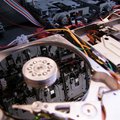 Let's get started everyone. Welcome to the Hack Chat, please pardon my typing -- sprained my finger yesterday. I'm Dan, I'll be modding today along with Dusan as we welcome Adafruit for their first Hack Chat of 2022!
Let's get started everyone. Welcome to the Hack Chat, please pardon my typing -- sprained my finger yesterday. I'm Dan, I'll be modding today along with Dusan as we welcome Adafruit for their first Hack Chat of 2022!

 We've got a livestream setup on YT - there it is ^^^
We've got a livestream setup on YT - there it is ^^^
 💾💾💾
💾💾💾
 So the setup is to ask questions here, and they'll answer over on the live stream, plus they'll text answers here too
So the setup is to ask questions here, and they'll answer over on the live stream, plus they'll text answers here too
 A multimedia extravaganza!
A multimedia extravaganza!
 wow!
wow!
 hi its ladyada! if you can't get parts, why not get ones that are no longer even made anymore! so ... retro tech :)
hi its ladyada! if you can't get parts, why not get ones that are no longer even made anymore! so ... retro tech :)
 floppy disks! both simpler and more complicated than you may think
floppy disks! both simpler and more complicated than you may think
 Can you even find floppies in e-waste anymore?
Can you even find floppies in e-waste anymore?
 a LOT of floppy disks were manufactured
a LOT of floppy disks were manufactured
 there is nothing electric about floppiesw
there is nothing electric about floppiesw
 Hi! I'm Jeff, and I work with Adafruit mostly on CircuitPython. Limor pulled me into this floppy project, and I'm having a blast getting back into the retro computing aspect of it.
Hi! I'm Jeff, and I work with Adafruit mostly on CircuitPython. Limor pulled me into this floppy project, and I'm having a blast getting back into the retro computing aspect of it.
 More likely than getting new microcontrollers @Dan Maloney
More likely than getting new microcontrollers @Dan Maloney
 and computers pretty quickly removed floppy drives, i think the market was a little 'shocked'
and computers pretty quickly removed floppy drives, i think the market was a little 'shocked'
 Sorry -- floppy drives
Sorry -- floppy drives
 yes often folks who toss our computers have delicious floppy drives in there
yes often folks who toss our computers have delicious floppy drives in there
 rescue them :)
rescue them :)
 PT gets the best stuff like signed "hackers" floppies
PT gets the best stuff like signed "hackers" floppies
 But getting more rare. I am currently on the search for (a lot of) drives and it is getting harder to get them.
But getting more rare. I am currently on the search for (a lot of) drives and it is getting harder to get them.
 goodwill, flea markets, and ebay are pretty good
goodwill, flea markets, and ebay are pretty good
 Some time ago you could get them anywhere computers were replaces. Schools mainly. But now known good drives can get quite expensive
Some time ago you could get them anywhere computers were replaces. Schools mainly. But now known good drives can get quite expensive
 try to get an usb floppy drive
try to get an usb floppy drive
 Extracted a drive from an old system the other day, but it's getting increasingly difficult to know that they're in alignment. I remember there was a Hackaday article discussing a Yamaha Disklavier with its floppy out of alignment.
Extracted a drive from an old system the other day, but it's getting increasingly difficult to know that they're in alignment. I remember there was a Hackaday article discussing a Yamaha Disklavier with its floppy out of alignment.
 a looooooooot of disk drives were made. they are out there
a looooooooot of disk drives were made. they are out there
 I'm doing stuff with vintage media that's a little more esoteric. Hard sectored 5.25" and 8" drives are my focus right now. Looking to image disks and emulate the drives.
I'm doing stuff with vintage media that's a little more esoteric. Hard sectored 5.25" and 8" drives are my focus right now. Looking to image disks and emulate the drives.
 why don't usb floppy drives always work? limor is answering ...
why don't usb floppy drives always work? limor is answering ...
 Limor's showing on the stream what's in a USB floppy
Limor's showing on the stream what's in a USB floppy
 for example, the prince floppy can't be read with a USB floppy drive (mac)
for example, the prince floppy can't be read with a USB floppy drive (mac)
 drive
drive
 There's a laptop floppy drive + a USB controller (no name, no datasheet)
There's a laptop floppy drive + a USB controller (no name, no datasheet)
![]() What I'm using is an old compaq 34 pin floppy drive
What I'm using is an old compaq 34 pin floppy drive
 the connector is a (semi) standard, the folks who make usb floppy drives get standard laptop floppies and repackage them with the controller
the connector is a (semi) standard, the folks who make usb floppy drives get standard laptop floppies and repackage them with the controller
 it only works with 1.44MB and only for IBM format floppies in MFM format
it only works with 1.44MB and only for IBM format floppies in MFM format
 You couldn't, for instance, read a Mac 800kB mac "GCR" floppy disk
You couldn't, for instance, read a Mac 800kB mac "GCR" floppy disk
![]() The slim drives in the usb ones are quite noisy and inferior to the full size drives, also the flex cable connector isn't easy to interface for diy.
The slim drives in the usb ones are quite noisy and inferior to the full size drives, also the flex cable connector isn't easy to interface for diy.
 if you remove the extra board, you can hook into the USB floppy disk with your own controller, like what we've been working on
if you remove the extra board, you can hook into the USB floppy disk with your own controller, like what we've been working on
 (or boards like greaseweazel if you can get 'em)
(or boards like greaseweazel if you can get 'em)
 Limor has found that the floppy controller can be flaky, and it's not good at reading damaged diskettes.
Limor has found that the floppy controller can be flaky, and it's not good at reading damaged diskettes.
 But if you have perfect 1.44MB DOS floppies that you want to read, go for it.
But if you have perfect 1.44MB DOS floppies that you want to read, go for it.
 One that's important to us is the "Prince Floppy", which is a Mac 800kB floppy. The mac floppy drive could rotate at different speeds, and stored a varying amount of data on each track. That's how they stored 800kB when DOS could only store 720.
One that's important to us is the "Prince Floppy", which is a Mac 800kB floppy. The mac floppy drive could rotate at different speeds, and stored a varying amount of data on each track. That's how they stored 800kB when DOS could only store 720.
 I've read 720KB MFM disks with USB floppy drives just fine.
I've read 720KB MFM disks with USB floppy drives just fine.
 we posted the contents of the prince floppy here - https://archive.org/details/prince_floppy
we posted the contents of the prince floppy here - https://archive.org/details/prince_floppy
![]() Question: Have you been able to identify the chip on those usb drives? If its a mcu it would be nice to reprogram it with a firmware which can read at fluxlevel.
Question: Have you been able to identify the chip on those usb drives? If its a mcu it would be nice to reprogram it with a firmware which can read at fluxlevel.
 Q: Are there any places/people making *new* floppy drives/disks? How difficult would it be to make a floppy disk?
Q: Are there any places/people making *new* floppy drives/disks? How difficult would it be to make a floppy disk?
 @Nick Tonn No, Limor didn't successfully identify the chip
@Nick Tonn No, Limor didn't successfully identify the chip
![]() cli tool was mentioned?
cli tool was mentioned?
 you cannot reprogram it - its almost certainly an asic
you cannot reprogram it - its almost certainly an asic
 @Nick Tonn they said it's an ASIC
@Nick Tonn they said it's an ASIC
![]() Could the fluxlevel thing be done with an oscilloscope? DS1054Z has 20 megs of RAM. 20 megasamples.
Could the fluxlevel thing be done with an oscilloscope? DS1054Z has 20 megs of RAM. 20 megasamples.
 Those were optical right? The sector sensors, I mean
Those were optical right? The sector sensors, I mean
 I think you could, you can download the full trace within the DS1054Z using USB or network .. you'd have some coding to do!
I think you could, you can download the full trace within the DS1054Z using USB or network .. you'd have some coding to do!
 @PixelDud you can buy new floppies, I know because some medical devices still use them
@PixelDud you can buy new floppies, I know because some medical devices still use them
 it costs a lot and takes a lot of time to certify a new medical device
it costs a lot and takes a lot of time to certify a new medical device
 Chris Fenton's Cray archaelogy is relevant to the flux-level issues.
Chris Fenton's Cray archaelogy is relevant to the flux-level issues.
 @deʃhipu cool, do you know the brand of them?
@deʃhipu cool, do you know the brand of them?
 @anfractuosity no, sorry
@anfractuosity no, sorry
 Dan, 8" had hard- and soft-secto
Dan, 8" had hard- and soft-secto
 @Dan Maloney yes they're optical on 5.25s at least, we're actually debating about 3.5 since there's no visible hole
@Dan Maloney yes they're optical on 5.25s at least, we're actually debating about 3.5 since there's no visible hole
 I thought that was a drive sprocket on the 3.5"
I thought that was a drive sprocket on the 3.5"
 This shugart interface is basically the same all the way back to 8" drives, isn't it? It should be do-able to image thoae drives almost exactly the same way, right?
This shugart interface is basically the same all the way back to 8" drives, isn't it? It should be do-able to image thoae drives almost exactly the same way, right?
 you can buy sealed packs of floppies on ebay
you can buy sealed packs of floppies on ebay
 @limor are they NOS though?
@limor are they NOS though?
 it's where it grabs, so it also knows the position
it's where it grabs, so it also knows the position
 Yeah, that makes sense
Yeah, that makes sense
 Sorry. Older discs (8 and 5.25) came in two variants some with one index pulse/hole per revolution and some with one pulse/hole per sector.
Sorry. Older discs (8 and 5.25) came in two variants some with one index pulse/hole per revolution and some with one pulse/hole per sector.
![]() I doubt its an asic, if it was an asic, there would be no reason for the asian manufactures to sand down the markings on the chip. Also i've seen usb-floppy pcbs with an unpopulated place for flash memory.
I doubt its an asic, if it was an asic, there would be no reason for the asian manufactures to sand down the markings on the chip. Also i've seen usb-floppy pcbs with an unpopulated place for flash memory.
 @deʃhipu ah yeah that makes sense now
@deʃhipu ah yeah that makes sense now
 it didn't at first
it didn't at first
![]() the 3.5" floppies have that tab to which the rotor grabs. I think it can be synced to the physical position of the rotor itself.
the 3.5" floppies have that tab to which the rotor grabs. I think it can be synced to the physical position of the rotor itself.
 Is it like a legacy thing?
Is it like a legacy thing?
 Index pulse needed to get the formatting right: all the tracks aligned.
Index pulse needed to get the formatting right: all the tracks aligned.
 Does the DD floppy's read both sides at the same time when reading data
Does the DD floppy's read both sides at the same time when reading data
![]() yes
yes
 Will: no. Side-select signal
Will: no. Side-select signal
![]() or do you mean parallel, then no
or do you mean parallel, then no
 DD is double density - it how close the magnetic flux pulses can be written/read
DD is double density - it how close the magnetic flux pulses can be written/read

 I have only seen double sided reading drives was in IBM land, older apple drives you had to manually flip the disc and put it back in to read the other side.
I have only seen double sided reading drives was in IBM land, older apple drives you had to manually flip the disc and put it back in to read the other side.
 DS is doublesided - theres' two 'heads', top and bottom
DS is doublesided - theres' two 'heads', top and bottom
 and you select which you want using a digital line
and you select which you want using a digital line
 How about the Apple 2 spiral tracks for copy protection
How about the Apple 2 spiral tracks for copy protection
 @Will S Merkens that'll be a challenge!
@Will S Merkens that'll be a challenge!
![]() microstepping of the head stepper?
microstepping of the head stepper?
![]() could also help with restoring data from misaligned floppies.
could also help with restoring data from misaligned floppies.
 Yeah despite having just ~35-40 tracks, the apple ][ drive can be stepped to about ~160 positions, while a PC drive can only hit ~80 positions
Yeah despite having just ~35-40 tracks, the apple ][ drive can be stepped to about ~160 positions, while a PC drive can only hit ~80 positions
 MS flight sim on apple had that protection method and boy the drive sure made horrible sounds
MS flight sim on apple had that protection method and boy the drive sure made horrible sounds
 The way an SD card looks to a PC is very much like a floppy - a sequence of 512-byte sectors.
The way an SD card looks to a PC is very much like a floppy - a sequence of 512-byte sectors.
 So we re-purposed USB Storage to create an Arduino sketch that can act as a USB floppy drive
So we re-purposed USB Storage to create an Arduino sketch that can act as a USB floppy drive
![]() could be also done with a raspi zero, in usb gadget mode.
could be also done with a raspi zero, in usb gadget mode.
 We tested it with the 360k (5.25) drives, try buying a USB 5.25" drive on amazon :wink:
We tested it with the 360k (5.25) drives, try buying a USB 5.25" drive on amazon :wink:
 Roman roads developed ruts based on the carts so people in Britain simply based carts and later trains on the same size the ruts in the road were in size
Roman roads developed ruts based on the carts so people in Britain simply based carts and later trains on the same size the ruts in the road were in size
![]() As far as i know does the floppy drive do not care if the data is mfm or gcr encoded, the floppy controller is the part thats cares about the encoding. for example the floppy controller of the Amiga could read and write MFM and GCR encoding with the same floppy drive.
As far as i know does the floppy drive do not care if the data is mfm or gcr encoded, the floppy controller is the part thats cares about the encoding. for example the floppy controller of the Amiga could read and write MFM and GCR encoding with the same floppy drive.
 nick - you'd think so but thats not truuuuuuuuuuuuuue :)
nick - you'd think so but thats not truuuuuuuuuuuuuue :)
![]() could that be done with a DSP? directly interface the head? then we have ALL the encodings we please. software-defined radio works at orders of magnitude above the needed data rates, I think.
could that be done with a DSP? directly interface the head? then we have ALL the encodings we please. software-defined radio works at orders of magnitude above the needed data rates, I think.
 playlist here as well, that has 1 min vids from each step / progress - https://youtube.com/playlist?list=PLjF7R1fz_OOWexf2WmY8cgM65ltPaAvyT
playlist here as well, that has 1 min vids from each step / progress - https://youtube.com/playlist?list=PLjF7R1fz_OOWexf2WmY8cgM65ltPaAvyT
 Some of the electronics in the floppy are optimized for MFM, in a way that can give problems when you read other formats... if you rip of even more of the electronics, you might be able to fix it(?) but that'd be a lot more work.
Some of the electronics in the floppy are optimized for MFM, in a way that can give problems when you read other formats... if you rip of even more of the electronics, you might be able to fix it(?) but that'd be a lot more work.
 I have the Epson SMD1300 looking for tech docs on what it can do.
I have the Epson SMD1300 looking for tech docs on what it can do.
 Very short & very long pulses that exist in the mac format can't be read because of details of the on-drive electronics
Very short & very long pulses that exist in the mac format can't be read because of details of the on-drive electronics
 sony drives work pretty good though
sony drives work pretty good though
 I'm psyched about this work. I have code I wrote in college on some floppies. I implemented RSA encryption when I was a senior in '86 when I was a C newbie and ran it on a Vax 11/780 (yep VAX MIPS are based on this machine). I'd really like to see how fast it runs on an my M1 Mac Mini.
I'm psyched about this work. I have code I wrote in college on some floppies. I implemented RSA encryption when I was a senior in '86 when I was a C newbie and ran it on a Vax 11/780 (yep VAX MIPS are based on this machine). I'd really like to see how fast it runs on an my M1 Mac Mini.
![]() +! for tee-ack
+! for tee-ack
 The best day to copy your data off a floppy is today
The best day to copy your data off a floppy is today
 yesterday
yesterday
 Ha, I think you folks are calling me old.
Ha, I think you folks are calling me old.
 "how long is the data likely to be good" ? ...
"how long is the data likely to be good" ? ...
![]() Old is relative.
Old is relative.
![]() "baking" the disks to make them work for a while, is it tested? I have seen it mentioned about audio tapes
"baking" the disks to make them work for a while, is it tested? I have seen it mentioned about audio tapes
 I stored all my 5.25 in floppy boxes and those are stored away
I stored all my 5.25 in floppy boxes and those are stored away
 what would currently be the most durable format for storing data at home?
what would currently be the most durable format for storing data at home?
![]() how does the stored signal degrade? can the oscilloscope approach give better chances of recovering old data?
how does the stored signal degrade? can the oscilloscope approach give better chances of recovering old data?
 cdrs tend to disintegrate too
cdrs tend to disintegrate too
 Baking will only work if the problem is water adsorbtion into the Mylar. It is likely to make things worse if the oxide is starting to come off.
Baking will only work if the problem is water adsorbtion into the Mylar. It is likely to make things worse if the oxide is starting to come off.
 Dan Maloney
Dan Maloney
Discussions
Become a Hackaday.io Member
Create an account to leave a comment. Already have an account? Log In.